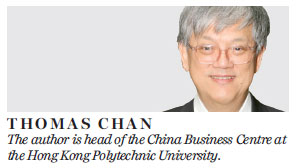Vietnam offers great opportunities
Updated: 2015-11-26 09:17
By Thomas Chan(HK Edition)
|
|||||||
Thomas Chan writes that Hong Kong needs to work on creating knowledge-intensive and financial services to export to Vietnam and other important markets in the region
Despite all the potential political conflicts that could disrupt peace and cooperation in the region, Vietnam remains a close neighbor of China. Economic integration between the two countries in the larger context of the ASEAN Free Trade Area (AFTA) and the upgraded ASEAN + China free trade agreement will facilitate trade and investment in the future.
China remains the largest source of imports to Vietnam. The Chinese mainland's industrial inputs (including those coming through Hong Kong) have been crucial in Vietnam's expansion of labor-intensive manufactured goods to the US - its largest export market. Even with the launch of the Trans-Pacific Partnership (TPP), Vietnam can not get what it needs for infrastructure investment and trade inputs from major TPP partners like the US and Japan. Vietnam has to rely on the mainland for growth and development. It is also deeply involved economically with Hong Kong.
Vietnam, with a population of over 92.5 million, offers cheap labor for industrial production for overseas firms including those from the mainland and Hong Kong. Higher production costs in the Pearl River Delta region have driven many firms which had been entrenched in Vietnam for decades to Hong Kong.
President Xi Jinping's visit to Vietnam helped strengthen the strategic relationship between the two countries. It laid the foundation for diplomatic resolution to potential conflicts and encouraged peace and development in the region. China has promised support for infrastructure investment in Vietnam - in particular the much-needed upgrading of its railway network. Probably this is the chief motive for Vietnam to join the China-led Asian Infrastructure Investment Bank. With a better bilateral relationship, there will be a better environment for foreign investment - mostly from the mainland, Hong Kong and Taiwan. This will further boost the region in terms of industrial processing and manufacturing goods for export.
As the region's world-class shipping and logistics center and international financial center, Hong Kong should try to benefit further from the development of the Vietnamese economy and the closer cooperation between China and Vietnam. However, Hong Kong needs to adjust to the new developments of industrial relocation to Vietnam and the increasing importance of infrastructure projects in the region. It also needs to develop new capabilities in these areas. One advantage in trade for Hong Kong is the recent surge of local exports (and re-exports) to Vietnam. This reflects the process of industrial relocation, but also the growing demand for industrial inputs in Vietnam.
Because of this, Hong Kong should reposition itself in its sourcing and re-exporting of industrial inputs, rather than finished goods as in the past. There should also be adjustments in logistics and related business services as well as in finance and insurance.
The last point reveals a major change in regional trade and business. It should have far-reaching implications for Hong Kong.
First, Hong Kong's industrial investment in the Pearl River Delta region has to be upgraded to overcome higher production costs there. Either the Hong Kong firms have to go up-market to enter skill-intensive and capital-intensive industries, or they have to shift to become producers and suppliers of intermediary goods for labor-intensive industrial processing in Vietnam and other low-cost production localities in the region and beyond.
Second, with the massive industrial relocation and development in the region, Hong Kong cannot compete in industries and instead should concentrate on higher value-added services - both producer services and consumer services. Shopping by mainland tourists will bring immediate revenues in tourism and local consumption. But unless it is linked up with greater investment it adds little of value. Investments, both public and private, in Hong Kong might be more sustainable if they are geared more toward knowledge-intensive services. This will provide value added to re-exports through local substitution production and cost-efficient just-in-time sourcing and logistical support. There should also be a chance for Hong Kong to facilitate trade between the mainland and Vietnam by providing renminbi trade facilities and loans. It can develop renminbi securities for Vietnam and for overseas firms doing businesses in that country.
Third, to gain advantages over service firms from overseas, Hong Kong needs to strengthen its understanding and knowledge of Vietnam. As Vietnam is tied to the AFTA, Vietnam could also be the gateway to other ASEAN countries - in particular, neighboring Laos, Cambodia, Thailand and even Myanmar. These countries all receive investment from Vietnam. New railways are now under construction to reduce the distance between them. Hong Kong should educate a group of professionals and businessmen in the Vietnamese language. This is to gain a competitive edge over other overseas service firms and centers. Just speaking English will not give Hong Kong any advantages, especially when combined with an ignorance of the society and culture of Vietnam and other ASEAN countries.
In the past, because of the migration of overseas Chinese to ASEAN countries, Hong Kong was the knowledge and business center of the region. Unfortunately, in recent decades this role has been declining.
Now should be an opportune time for Hong Kong to take advantage of the Belt and Road strategy in order to boost this role.

(HK Edition 11/26/2015 page10)